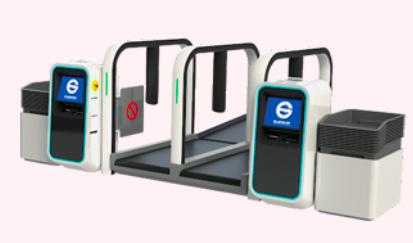
3 minute read
The Touchless Travel Report Touchless travel blueprint unveiled for the post-COVID-19 world
THE TOUCHLESS TRAVEL REPORT
Touchless Travel Blueprint Unveiled For The Post-COVID-19 World
Advertisement
SimpliFlying’s latest report called “The Rise of Touchless Travel”, details almost 30 different areas in the passenger journey that are expected to go touchless, to restore confidence in flying after COVID-19. The report is powered by an innovator in touchless technologies, Elenium Automation.
The next time you go to an airport, don’t expect to touch anything other than your own mobile phone. From arriving at the airport to collecting your luggage, the future of air travel in the COVID-19 world and beyond will be automated, touchless and more convenient than it has ever been.
SimpliFlying’s new report shows what touchless travel will look like, detailing 29 areas of the passenger experience that are set to change. The report is produced in partnership with Elenium Automation.
The aim of the report is to act as a blueprint for airlines and airports worldwide. Many of the solutions detailed are Live now, with others in the final stages of development. The different areas of travel going touchless include:
- PPE vending machines when you arrive. Examples of airports that already have these include Dubai and Las Vegas.
- Kiosks and terminals that measure your vital signs and connect you to a Doctor via video if needed. Developed by Elenium Automation, these terminals are being piloted by Abu Dhabi Airport right now.
- Touchless check-in and baggage drop. Biometric recognition eliminates the need to scan boarding passes. With the use of Elenium’s BagDNA, each bag is then uniquely recognised in three seconds without the need to use any form of bag tags.
- Touchless airport security involves advanced body scanners, as well as bag scanners that remove the need for you to remove items such as liquids and place them on trays.
- Touchless shopping where you order via apps, digital vending machines and virtual ‘shopping walls’. Passengers will be recognised via biometric data, and can also have the shopping delivered direct to their hotels or homes.
- Contactless boarding, like ‘bingo boarding’ pilot at London’s Gatwick Airport, where you are individually called up when it is time to board, instead of crowds milling around the gate.
- No more seat-back pockets, with both safety cards and food menus being displayed on the seat-back screens and accessible digitally via your phone. This is a solution in development now by IFE company PXcom.
- Self-cleaning lavatories, such as those developed by Boeing in 2016, where ultraviolet lights disinfect 99.99% of germs.

Finally, upon arrival passengers can expect to see touchless immigration and customs procedures, and baggage notifications, again to stop crowds congregating around individual baggage reclaim belts.
According to SimpliFlying CEO Shashank Nigam.
“As they say, necessity is the mother of invention. Ideally, it would not have taken the tragedy of the global pandemic for the industry to embrace touchless technology wholeheartedly, but I’m convinced that the end result will in many ways be better and more seamless all around,”
“We thought there must be a better way, so we started by building kiosks, bag drops, and boarding gates and trying to make them as quick as possible with the whole idea that somebody checks-in in five seconds, drops off their bag in five seconds, and boards in five seconds”, says Elenium Automation CEO Aaron Hornlimann.
Coinciding with the release of the Touchless Travel Report, the SimpliFlying Launchpad accelerator is accepting applications from innovative startups that are ready-to-deploy technologies and solutions to help kickstart travel.
“We’re working with innovators to bring their solutions to aviation, by guiding them through the complexities of the industry and helping them pilot at leading airlines and airports. As a result, our latest report isn’t a series of predictions. Rather, it’s a blueprint of what airlines and airports need to do now, with most of the technology listed being either already ready or very close to going Live,” adds Nigam.
To download a copy of the report, click here.










